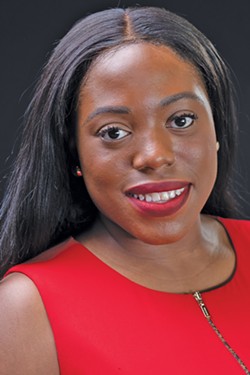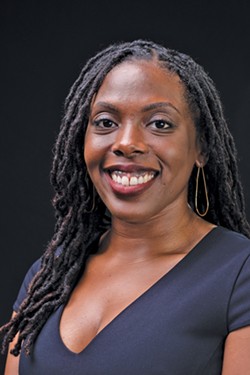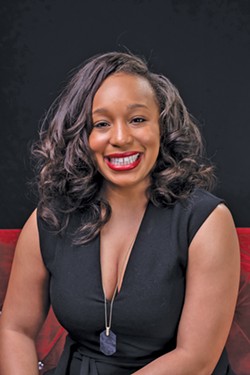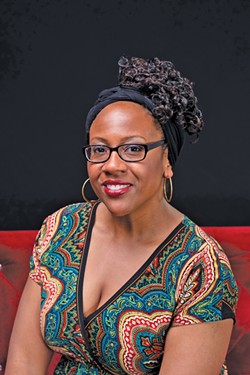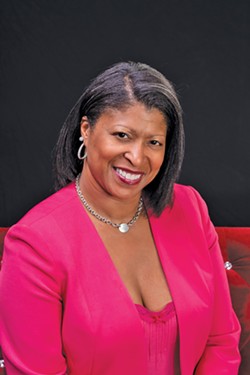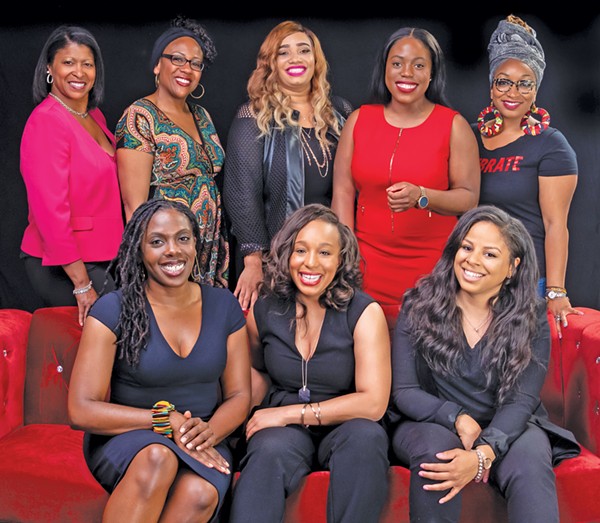
"It seems that most coverage of black women in Cleveland is on the low end, where we're talking about the disparities," says Lauren Welch, the director of marketing and communications at Karamu House. "Or it's C-Suite. But there really isn't quite as much knowledge about the day-to-day women who aren't C-Suite but who also aren't poor. There's no in-between.
Welch is also the executive director of the Women's Leadership Guild, where she works tirelessly to promote and advocate for black women. If that wasn't enough, she recently cofounded the Scarlet Letters project to shine light on workplace harassment. In that role, she works to provide a safe space for people to share their stories and be heard. And that's exactly what she's provided on this May evening. She has gathered 10 black women together for an informal roundtable. With few preset guideposts, the ensuing hours of discussion ebbed and flowed from somber topics to ebullient stories of success; from what's missing in their lives to strengths they hold dear; from professional to personal and the interplay between; from the many dimensions of self to a narrowly defined identity.
"I think that white people only see black people as related to them when we are like down in the dumps or when we have power and leadership," Welch says. "Why do you only think of me when I'm here or I'm here?"
Khalida Sims jumps in.
"We can unpack so much, but it's more like, what do you want to know versus what do we share," she says. "I think everyone can spend days talking about their perspective. I am a daughter, I am a sister, I am an auntie, I am a cousin and I am one of two black women who work for the county at the public defender's office. My narrative also comes from being a dark-skinned black woman. That doesn't mean that I'm trying to disconnect from my light-skinned sisters, but my narrative is different because of how I am approached. Also, I have locks and I have a gap. I am undeniably black."
Sims quickly points out the obvious.
"It's interesting the lack of representation at Scene as far as black women, and yet you're doing a piece on black women," she says. (I am, for the record, a white, Jewish woman.) "Not to minimize. I appreciate the position that you are in, but I think we also have to recognize that that's a part of the problem, that's why you have this piece being done."
The table collectively nods in affirmation, because it's true. It's also true of every single newsroom in Cleveland.
Bishara Addison, the senior manager of policy and strategic initiatives at Towards Employment, follows the thread.
"I would hope that you have a balanced article," she says. "I bitch all the time about what I'm upset about, but black women are the most educated group in America; we have a lot to celebrate. It's easy for me to just tell you all the things that are bothering me, but we also want to be able to tell the story of the people who supported us.
"A lot of the support that I've had in my professional career [has come from] white, Jewish women and white men who have done a lot for me. But there have also been some white folks who have made it really difficult for me to do my job. I have black women in my life who have really modeled excellence and helped me, but then when I think about [a recent job], my most problematic people were black men. But then we have to unpack that. There's a historical context of why this relationship is so toxic. So, I can be mad interpersonally, but then when I look at the broader picture ... ."
Tiffany Hollinger, a real-estate agent and small business owner, cuts in.
"I'm sorry, but we always empathize with everyone," she says. "Like, she's not allowed to be angry. She rationalized her anger. We don't get to just be angry, we have to nurture and compartmentalize. So if anything, I think that, tearing back the onion here, there is a profound story of how we don't just get to be."
That experience of not being able to just be, of doing so much for everyone else, is a physical and mental danger to black women, according to Sharisse Edwards, a mental health professional and a licensed clinical counselor who is at the forefront of the mental health crisis in Cleveland.
"I worry about black women because we have too much sometimes, and we feel like we have to do too much," she says. "But we are enough. We're selling ourselves short. We put everyone else ahead of us, but when we fall down with diabetes, high blood pressure, even cancer, illnesses and things that can be preventable, everyone's like, 'Mom's sick, what are we going to do?' And no one knows what to do to help her, because we don't take care of this ourselves. We're too busy taking care of everyone else."
Everyone nods. Several women mention John Singleton, the Oscar-nominated director of Boyz n the Hood, who recently passed away at the age of 51 after suffering a stroke.
"It's like we're dying of the same things," Edwards says, "stuff that's preventable. And I don't know exactly what to do but the conversation has to start."
Latoyia Jones is intimately familiar with the subject, having founded Alive on Purpose, a nonprofit dedicated to suicide prevention through systems of support and self-discovery.
"I was raised by three strong black women," she says. "My mother died of a crack addiction and my job is to stop the perpetuation of dysfunctional families. If I can raise healthier girls, who know how to raise themselves, who know how to get access to resources, who know how to build healthy lives, then we can one day turn around the future of our community."
Jones works as a trainer at a large corporation in Cleveland where she too is an Only in her space.
"I took that job while I was doing Alive on Purpose to be a representation to the hundreds of black people who will be employed [there]," she says, "so they can see a face that looks like them while they're trying to make their money."
Across the table from Latoyia is Khrys Shefton, director of real estate development at Famicos Foundation.
"In and of itself, what I do for a living is hard for people to swallow because I am a gentrifier," she says. "I'm not mincing words and I'm not ashamed of it either, because when you look at the history of Hough and Glenville, the black people who lived in these neighborhoods, they were not poor black people. They were black people of means. They were educators and attorneys; they were powerbrokers, movers and shakers in the city. So, when we have these conversations about gentrification, it becomes really complicated because we want to talk about it from a race perspective and we want to have a conversation about why people are taking our stuff. But, actually, we're giving away our neighborhood actively. It is a choice that we make every single day.
"When I took this job five years ago, one of the first questions I asked was, 'Why don't we sell houses to black people?' And all of my white counterparts looked at me and said, 'I don't know. We don't have to [sell only to white people] but those are the people who buy.' Well, why?" she says. "There becomes this larger narrative about how we, as black people, as black women, how we love ourselves, how we view ourselves, how we look at things that belong to us and we don't look at them as being of value. But, when a white person has it, we love it, we covet it. So, this neighborhood, now it's valuable because white people are interested, but it had value all the time."
Chinenye "ChiChi" Nkemere calls herself a gentrifier as well. She grew up far from the neighborhoods that Shefton works in but has decided to make the city of Cleveland her home.
"My black story is a little different in the sense that my parents came to the United States from Nigeria," she says. "Growing up in Pepper Pike, I thought I had lots of black friends, because there were like seven of us and we were just rocking it. When your parents come from a majority-black country, even a country that was colonized so heavily and brutally as Nigeria, there's no separate idea of black. That was not a thing that I grew up with. I was very Nigerian. But the idea of blackness, that did not hit me — and when I say hit me, I mean hit me directly in the throat — until I went to Ohio State."
The other Buckeyes in the room give a cheer. ChiChi nods.
"It was the best decision I ever made. I loved college but almost immediately, I was like, 'Is this what this black stuff is?' Within a week, a girl that lived down the hall said she wanted to lynch me. And it was fucking wild to me because I'm coming from an extremely privileged area where the only thing that mattered growing up was money. And then I go to Ohio State and I'm thinking everything is like that. But, they're like, 'No, you're a nigger.' They were like, 'You got into school because of affirmative action.' I was like, 'I actually didn't get the black scholarship.'
"I became very angry for years. And I have this very triple consciousness now. I am very Nigerian, but the older I get the more I realize that I am also very black. And I'm blessed, in the sense that the black American community not only welcomed me with open arms, but I get to pick the things I like. And then I also am very much a womanist. I wish I could care about what's going on for men, but I feel like I have my own things. We do so much as black women, rationalizing men's behaviors. I'm very open that I'm going through a divorce, because there a lot of black women who are quiet and hush-hush about it. I don't need to be. I don't have to be ashamed about it at all."
Addison, who also grew up in a suburban community, jumps in.
"One of the key takeaways," she notes, "is that black women in Cleveland are not a homogeneous group. So, I have different experiences from what I've heard. I would say that Shaker is different than Pepper Pike and some other suburbs. Shaker and Cleveland Heights are bubbles with a totally different group of white people. And white people are not a homogeneous group either. When I got to George Washington, where I went to undergrad, I was like, 'These aren't my Shaker white people!' I was so used to my liberal Jewish white people. And there are issues in that group too, and there were plenty of racial issues in Shaker, but they totally played out differently. Because in Shaker and our little bubble, everyone loves each other, and we are prioritizing diversity and inclusion. White people and black people who move to Shaker, where we have the highest property taxes in the state, move to Shaker because we care about diversity. So, if you don't like black people and you don't like Jewish people, you probably don't need to move to Shaker."
"There are different kinds of Cleveland black," says Shefton. "There's your sorority girls and then you got ... the opposite. There's city black, which is a term I've come to hate so much. But it just refers to the people who have been here for generations and have never been out. And it's not about economics, because I know plenty of black people who grew up in the city of Cleveland who now live in Twinsburg or Macedonia. And they love it so much. But it's like, don't you feel terrible every day when you go outside and you don't see any black people?"
"I grew up in California," says TerDawn DeBoe, a digital marketer who runs a 10-person agency, who is also a partner in Dream Creative Complex, a space for creatives, and who additionally aims to soon open the Cleveland Experience Center, a 25,000-square-foot event center in Bratenahl. "I lived in a place with a lot of different races, but it's so black and white here. I was so confused when I moved here. Everything is so segregated and so separated and it makes things difficult. I've walked into a lot of conferences being the only, or one of the few, black people there and then not being taken seriously there. It's like, 'Who do you work for?' No, I own this.
"I was trying to create a show called What's Good Cleveland, and I wanted to have more than just black people on it so I could show what's going on in all of Cleveland. But when I pitched it to people and they found out I'm the owner, then it became 'A Black Business.' Then it becomes 'A Black Show.' And then it becomes 'A Black Thing.' Why do I always have to prove that I deserve to be doing this? Or that this concept is great? Because it always comes back to it being a black-owned company and so no one else wants to be involved."
Dr. Shemariah Arki, a professor of Pan-African studies at Kent State University, is also a committee member at the Ellipsis Institute for Women of Color in the Academy, where much of their work is centered on helping women unleash their potential.
"What we do is create space for women of color to come together across lines of differences to pursue a common goal," Arki says. "It's so that we can kind of take a break from being 'the Only' in the space. Instead, we're at the space like this where you say, 'Hey!' and everyone says 'Hey!'"
Women who have been part of the Ellipsis Institute have gone on to share their ideas with larger platforms, allowing them to make their voices heard, even when they remain 'the Only' in the room. But Arki is dedicated to more than institutional platforms. She works with creative entrepreneurs to help them develop their capacity to translate their internal strength into a finished product: "to do the work on yourself, in order to make your work successful."
That work — being vocal and advocating for oneself and one's community — is something Welch has worked on too.
"Two years ago, I just decided to stop playing nice with racist and sexist people in the community, because I kept feeling like, if I'm in this seat and I'm at this table and I'm the only one and I say nothing, I can't make room for someone else to come and fill this seat after me," she says. "But it's hard because Cleveland will retaliate. Because people want to treat you differently when you talk about these issues. People want to hide behind and not take responsibility or accountability for these types of behaviors. But it comes at a cost, because if I'm mad at you all the time and we're at each other's neck, we will never learn anything from one another.
"And I want you to understand that black women are very valid about being angry. When I came in the gate, I was like, we are just going to play nice with these people real quick and see what happens. I was just happy to be there. But then the climate changed. The climate got worse and then as it got worse, Cleveland got worse. You can feel the impact of it more and I'm talking about people being real bold about it. I feel that more now."
Khrys Shefton doesn't feel angry, but she's not shy about speaking the truth.
"I'm not angry," she says. "I'm aggressive and I'm not afraid of you. I'm tired of people assuming that since I'm not gonna take your bullshit, I'm angry and we need to call me into HR."
"It's okay to be angry too, though," Arki says. "We have a right to be angry!"
Nodding, Nkemere adds, "And I am so angry because I know I'm degreed and I'm pedigreed, but I still feel like shit. Because I'm watching America go to shit. A country I feel so patriotic about but, essentially from 2003 on, it's not the America my parents showed us in the '90s."
Looking at Nkemere a few seats away, Jones says, "ChiChi said she likes getting on the inside of things. She said she was angry. You heard that, right? Well, when I look at ChiChi, I imagine a fireball which literally needs the energy around it in order exist. You need that energy in order to do what you do. The anger is not misplaced. It's not, 'I'm angry and I'm black.' It's, 'I'm ChiChi and I need this fireball to be able to do what I do' When you sat down you brought magic. You are overflowing and giving it away. You can't do that when you are empty. You gave us life; you gave us energy; you gave us wealth.
"Being black is being able to know that we can't do it alone," she continues. "Because we don't know what tomorrow brings. We have to be able to say, 'Hey black girl, I see you.' We are facing a world that is so heavy, and as black women we have to be able to say, 'Here, here's some armor.' I'm sitting here listening to you all and you're saying a lot of words that I don't know. And I don't want to know, because it's heavy. But even though I don't understand it, I do know what a black woman needs in order to carry it."

